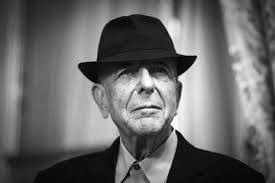''There's a crack in everything - that's how the light gets in.'' [Leonard Cohen]
...actually I would say that's how the light gets out.... because every single thing in this world contains a Divine spark, and when we utilize that object in a good way, as part of a mitzvah, we redeem the sparks. This is called birurim.
Sitting in his hotel room in New York, Rabbi Sacks suddenly had a thought about a connection between the late Leonard Cohen's final song "You Want It Darker", the current state of the world and the week's parsha of Vayera.
The following is written by Zvi Hershcovich
Leonard Cohen was given a Halachic Jewish burial in a quiet ceremony before the media was notified of the poet and musician's passing.
 |
| Leonard Cohen |
Leonard [Eliezer Ben Nissan HaKohen] was born in Montreal on the 12th of Tishrei, 5695 [September 12, 1934]. His great-uncle, Rabbi Zvi Hirsch Cohen, a pious graduate of the Volozhin Yeshiva, had been the chief rabbi of Montreal and Canada.
Born in Westmount, both his grandparents were prominent Orthodox Jews. His mother's father was Rabbi Shlomo Kolnitsky-Kline, a graduate of the Kovno Yeshiva. He was called the Sar HaDikduki (master of grammarians), and he wrote important Sefarim, including a thesaurus on Talmudic interpretation. His father's father was Lyon Cohen, one of the founders of the Shaar Hashomayim Shul, of which Leonard was a member.
In an interview with Jeff Burger, he told the biographer that he often reads Tehillim to find inspiration for his music and poetry. "When they lift up the Torah and say ‘Etz chayim hi l’mah chazikim bah,’ that kind of thing sent a chill down my back," he said. "I wanted to be that one who lifted up the Torah."
 He also recalled his pride at being a Kohen. "I wanted to wear white clothes, go into the Holy of Holies, and negotiate with the deepest resources of my soul," he told Burger. "That was poetry to me."
He also recalled his pride at being a Kohen. "I wanted to wear white clothes, go into the Holy of Holies, and negotiate with the deepest resources of my soul," he told Burger. "That was poetry to me."
As Cohen's fame grew, he took public stands for Jewish causes and openly displayed his Judaism with pride, singing in Yiddish and going on a tour in Israel where he performed the Birkas Kohanim. During the Yom Kippur war in 1973, he flew to Israel to perform and raise the morale of Jewish soldiers. Cohen's father had fought in World War I, and he rushed to Israel, because as he later told the media, "I am committed to the survival of the Jewish people."
According to the New York Times, he was Shabbos observant on tour and wore Tefillin. He described inheriting his grandfather's Tefillin, gazing at them and trying to make sense of them. "I saw I really could use this material, how exquisite and skillful these prayers were, how they had been designed by minds that you have to incline your heads towards," he said. "These minds who designed these prayers or received the inspiration to design these prayers–these are incredibly subtle and exquisite prayers for lifting the soul."
Just before Rosh Hashana, Cohen released a single which he worked on together with Cantor Gideon Zelermyer of the Shaar Hashomayim and his choir. The song quotes directly from the mourner's Kaddish.
Cohen passed away on Monday, the 6th of Cheshvan [November 7] and was buried quietly in the Orthodox Jewish tradition near the entrance of the Shaar Hashomayim cemetery on Mont Royal.
The media was notified of his passing on Thursday when the Shaar Hashomayim issued a release which noted that, "Leonard’s wish was to be laid to rest in a traditional Jewish rite beside his parents, grandparents and great-grandparents."
Rabbi Adam Scheier shared in a post on social media, that the community had taken great pride in Cohen. "Our pride was not simply that a child of the congregation grew up to be successful and famous; rather, it was that Leonard took the Jewish themes and concepts that he learned at The Shaar and gave them new and inspired expression in his poetry and his songs," wrote Rabbi Scheier. "It was at The Shaar that Leonard first encountered the liturgy of Who By Fire, the praise of Hallelujah, and the reverence of Hineni, I’m ready, my Lord."



.jpg)







